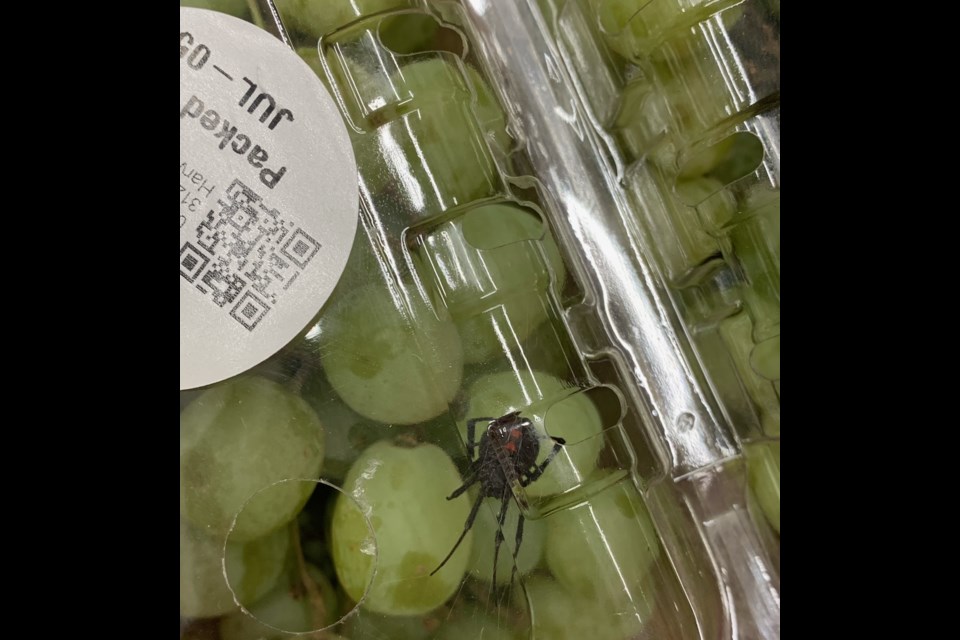If your grapes move, you may want to do a double check to see what may be in with them.
This past Saturday (July 16), Zach Greenwald and his fiancee, who live in northeast Barrie, went for their regular grocery shopping excursion to Costco in the city's south end.
Greenwald said there was nothing out of the ordinary when they went to grab some grapes, except he saw what at first looked like a bad grape.
“There were only a couple cartons on the top part, so I reached under to grab at those ones below and pulled one out," he explained. "At first, I thought it was a rotten grape inside or something, but then I realized it was a spider. I thought right away it was a black widow because they have that big body. My fiancee watches shows about that stuff and she knew immediately it was.”
Greenwald said the spider “was moving a little bit and was alive, but was probably knocked out from the cold,” because it had been in the Costco cooler.
He says he took the container to some nearby workers and told them about his troubling find.
“I didn’t want anyone to end up buying the grapes, taking them home and this thing bites their pet or something,” Greenwald said.
While he isn’t sure what happened next, a Costco manager said on Sunday that she had no report of the incident, but that “didn’t mean it didn't happen, just that I haven’t received the email about it if it did.”
The Costco manager also said she had heard of this type of thing happening before in other grocery stores, but couldn’t recall it occurring at Costco.
Costco's corporate office in Ottawa was called for comment, but a reporter was unable to speak to a representative.
The Canadian Food Inspection Agency (CFIA) said the organization does not track sightings of black widow spiders, as they are not a regulated pest.
“Even though these are not regulated pests in Canada, we still recommend consumers report these insects to the CFIA to confirm species,” the representative explained in an email.
The CFIA website says black widow spiders are rare in Canada, found mainly in southern regions along the Canada-United States border.
Greenwald said the grapes where the spider was found were of the cotton candy variety and came from Mexico.
Black widows are shiny black, with a distinctive red hourglass-shaped mark on the underside of their stomach. They are not aggressive and prefer fleeing when disturbed, so it will only bite to defend itself, according to the CFIA.
A black widow bite can cause severe pain at the bite site and lead to painful muscle contractions. While the bites are typically not life-threatening for healthy adults, medical attention should be sought following a black widow bite, particularly for children and the elderly.
The CFIA rep said if any black widow spiders are found, the entire product, including the insect, should be bagged and submitted to the local CFIA office immediately.
The CFIA was also asked what the protocol is if a black widow spider is found.
“When a consumer reports finding a black widow spider in fruit, a CFIA inspection staff member communicates with the individual to collect the specimen, and to gather information on the product in which the insect was found, including where the product was purchased,” said the representative. “Having the specimen facilitates the inspection at the place of purchase and further up the distribution chain. If required, CFIA may also submit the specimen for species identification.”
The representative advised that if you have been bitten or stung, or if you see blisters on the surface of your skin, you should seek immediate medical attention.
Greenwald said that while he hasn’t thought much about pests in produce before, he will definitely be mindful when shopping in the future.
“I never thought about checking before or even thought about spiders in my fruit, but you better believe I’ll be checking always from now on,” he said.
